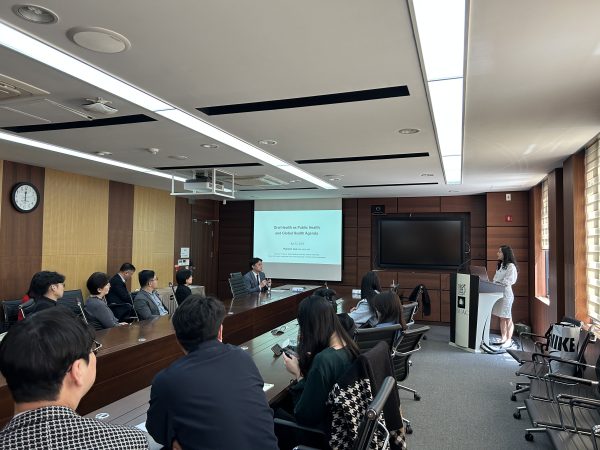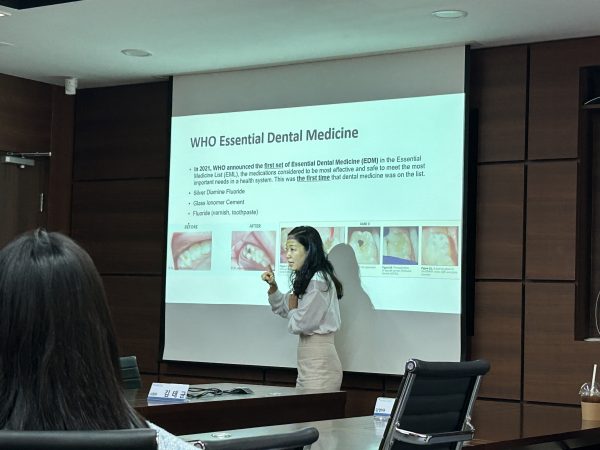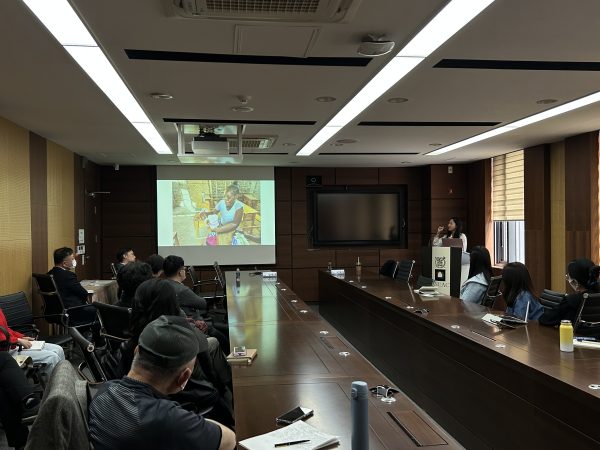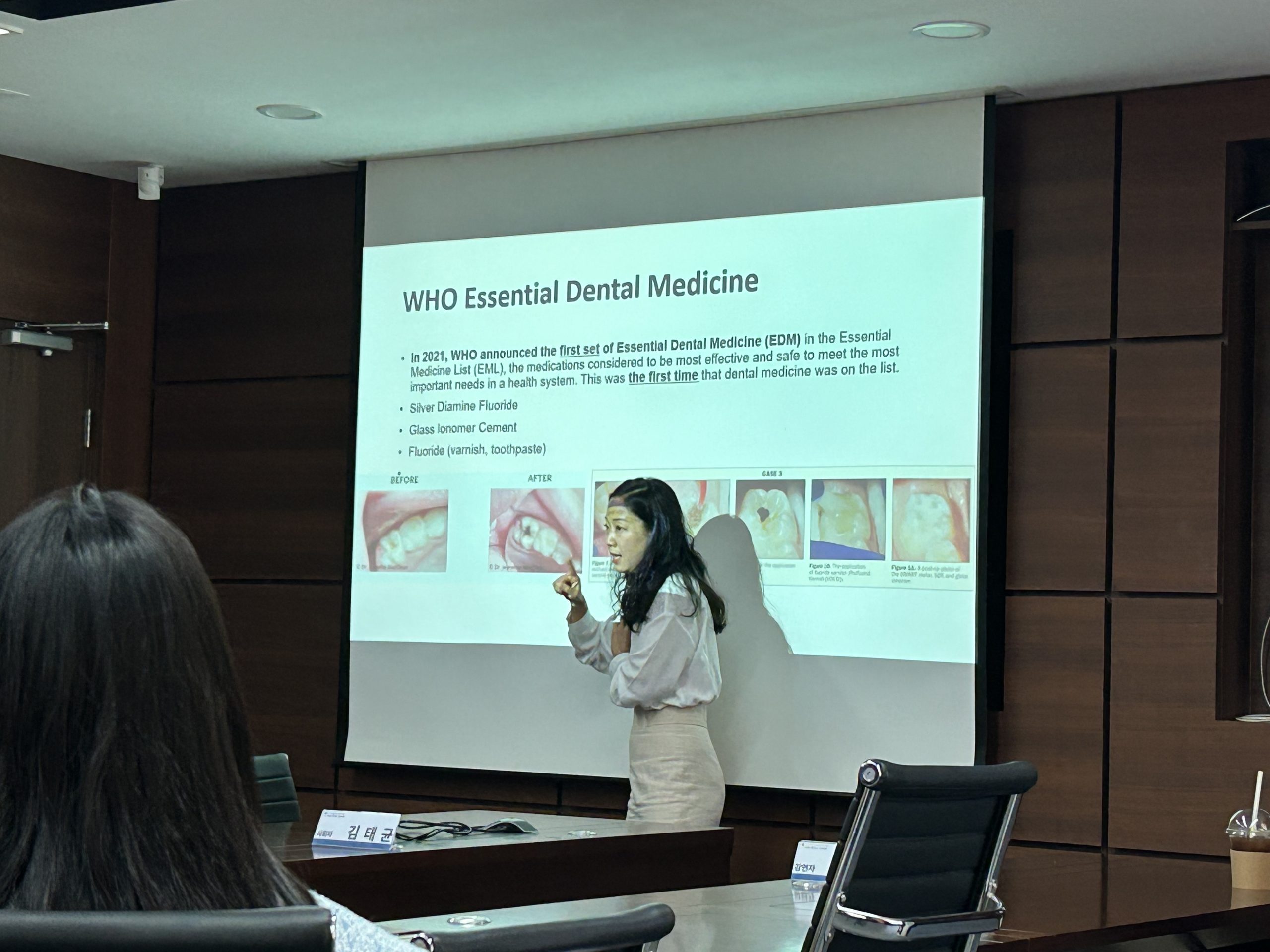행사 일정
○ 일시: 2023년 4월 21일(금), 12:00-13:30(KST)
○ 장소: 서울대학교 아시아연구소 국제회의실(303호)
○ 주제: Oral Health as Public Health and Global Health Agenda
○ 강연자: 이혜원 교수 (서울대 치의학대학원 기초치의과학과)
행상 리뷰
서울대학교 아시아연구소 아시아-아프리카센터는 서울대학교 치의학대학원 치의과학과 이혜원 교수를 모시고 2023년 4월 서울대 아프리카 세미나를 진행했다.
이혜원 교수는 서울대학교 치의학대학원 치의과학과 조교수이며 세계보건연맹(WFPHA) 구강보건위원회의 의장직을 맡고 있다. WFPHA는 전 세계적으로 130개의 기관 멤버와 약 500만 명의 공중 보건 전문가들로 구성된 세계보건기구(WHO)인증 NGO이다. 이혜원 교수가 소속되어 있는 구강보건위원회는 여러 국가의 구강 건강을 개선하기 위해 구강 정책에 대한 연구 및 결의안을 발표한다.
강연은 이혜원 교수의 대학 시절 소아치과 봉사 운영을 시작하게 된 계기로 시작되었다. 이혜원 교수는 미국의 한 빈민가에 위치한 보건소에서 학과생들과 함께 소아 치과를 운영한 경험이 있음을 언급하며 취약 계층의 구강 건강에 대해 생각해보게 되었음을 말하였다.
이어서 충치와 치주염의 개념을 제시하였으며, 구강건강이 신체에 미칠 수 있는 영향에 대하여 설명하였다. EU의 조사 결과 구강질환은 당뇨와 심장질환에 이어서 가장 비용이 많이 드는 질환이다. 이혜원 교수는 충치와 치주염은 예방이 가능한 것이나, 35억 명(전 세계의 약 45%)이 앓고 있을 만큼 가장 흔하고 비용이 많이 드는 질환임을 언급하였다. 또한 수입별, 인종별 치과 방문율을 자료로 제시하며 개발도상국에서의 구강보건의 취약성을 언급하였다. 다음으로는 WHO에서 발표한 구강 보건정책 및 데이터에 대하여 설명하였다. WHO는 2030년까지 보편적 구강 건강을 보장하고 필수적인 양질의 건강 서비스에 접근할 수 있는 비전을 발표하였으며 오랜 기간 국제 보건에서 도외시되던 구강 보건의 보편화에 대한 기대를 표했다.
다음으로는 모자 구강보건을 주제로 발표를 이어 나갔다. 산모의 구강건강은 자신의 아이의 구강건강에 영향을 미칠 수 있다. 산모가 치료되지 않은 충치를 가지고 있으면 그 아이는 충치를 가질 가능성이 3배 이상 높으며, 치주염에 있어서도 영향을 미칠 가능성이 높다. 그리고 나이대별 치과 방문율 자료를 통하여 구강 진료가 중요한 만 1-4세의 치과 방문율이 타 연령대에 비해 낮음을 제시하였다. 이혜원 교수는 엄마들이 아이들의 1차 진료자로서 역할을 해야 함을 언급하였으며 자녀와 가족의 구강 건강을 증진하기 위해선 여성의 역할이 중요함을 강조하였다.
하지만 앞서 언급한 내용들이 인프라가 갖추어지지 않은 개발도상국에서는 어떠한 의미를 가지는지에 대한 의문점을 제시하며 실제로 이혜원 교수가 연구를 진행하는 케냐의 한 마을에서는 치과 및 치과의사에 대한 인식률이 낮음을 언급하였다. 이혜원 교수는 베이스 데이터조차 구축되지 않은 곳에서 아이들이 타 질병으로 인한 것이 아닌 충치나 치주염으로 인해 학교에 가지 못하는 것을 예방하고 구강 보건에 대한 인식을 향상시키는 것이 목표이며 효과적인 구강 보건 체제를 확립하기 위한 프로젝트를 진행중에 있음을 알렸다. 이후 약 20분간의 질의응답 시간을 가진 뒤 강연을 종료하였다.
Event Review
The Asia-Africa Center of the Asia Center at Seoul National University hosted the Seoul National University Africa Seminar in April 2023 with Prof. Lee Hye-won of the Department of Dental Science, Seoul National University Dental Science.
Prof. Lee Hye-won is an Assistant Professor in the Department of Dental Science, Seoul National University Dental Science and Chair of the Executive Oral Health Workgroup, World Federation of Public Health Association (WFPHA) Oral Health Committee. The WFPHA is an international, nongovernmental organization representing around 5 million public health professionals worldwide and is accredited as an NGO in official relations with the World Health Organization
The lecture began with Prof. Lee’s inspiration for starting a pediatric dental outreach program in college. Prof. Lee mentioned her experience running a pediatric dental clinic with her undergraduate students at a health center in a slum in the United States, which made her think about the oral health of vulnerable populations.
She then introduced the concepts of tooth decay and periodontitis and explained the impact that oral health can have on the body. Prof. Lee noted that although tooth decay and periodontitis are preventable, they are the most common and costly diseases, affecting 3.5 billion people (approximately 35% of the world’s population). She also presented data on dental visit rates by income and ethnicity, highlighting the vulnerability of oral health in developing countries. She then explained the oral health policies and data published by the WHO. WHO announced its vision to ensure universal oral health and access to essential quality health services by 2030 and expressed its hope for the universalization of oral health, which has long been neglected in international health.
Next, Prof. Lee continued her presentation on maternal and child oral health. A mother’s oral health can affect her child’s oral health. If a mother has untreated tooth decay, her child is more than three times more likely to have tooth decay and periodontitis. In addition, data on dental visit rates by age group showed that dental visit rates were lower for children aged 1-4 years, a critical age for oral care, than for other age groups. Noting that mothers should serve as the primary caregivers for their children, Prof. Lee emphasized the importance of women’s role in improving the oral health of their children and families.
However, this raises the question of what this means in developing countries where the infrastructure is not in place, and indeed, in one of the villages in Kenya where Prof. Lee conducts her research, there is little awareness of dentistry and dentists. Prof. Lee shared that she is working on a project to establish an effective oral health system with the goal of preventing children from missing school due to tooth decay or periodontitis rather than other diseases, and to improve oral health awareness in places where there is not even basic data. The presentation was followed by a 20-minute Q&A session.
Event Photo





